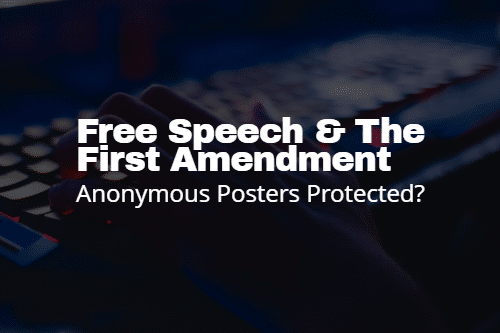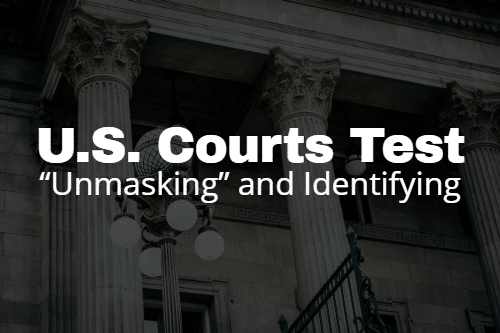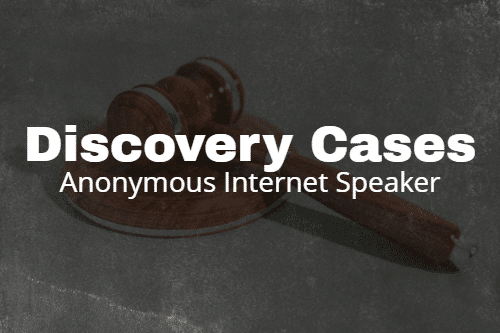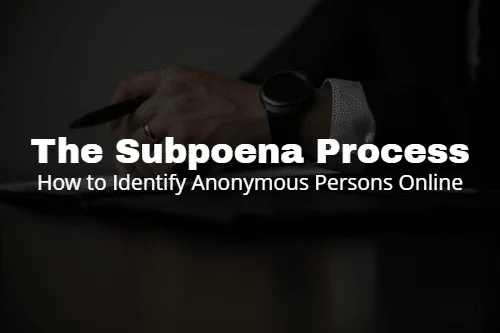
How to Identify Anonymous Persons & Defamers Online
This page has been peer-reviewed, fact-checked, and edited by qualified attorneys to ensure substantive accuracy and coverage.
In this all-encompassing blog post, we’re going to walk you through how to identify anonymous persons and defamers online, First Amendment protections for online posters and trolls, the various legal tests employed by courts when identifying anonymous speakers, several cases applying such unmasking and identifying tests, the subpoena process, and more!
- To identify anonymous persons and defamers online, libeled parties will likely need to pass muster with their state’s respective balancing test for unmasking and identifying anonymous online speakers and persons. Most U.S. states follow the standards set out in Dendrite International v. Doe, and Doe v. Cahill, which require a plaintiff to:
- Make a good faith effort notify the anonymous speaker of the impending action;
- Identify the exact statements at the heart of the action and establish a prima facie cause of action;
- Support each element of their claim with sufficient evidence; and
- Prove the need for disclosure outweighs a defendant’s First Amendment right to anonymous speech.
- U.S. state courts will usually look to the cases of Dendrite International v. Doe and Doe v. Cahill as the fundamental legal precedents for determining when a court should unmask and identify an anonymous speaker.
- Besides a court issuance of a subpoena, two other methods for identifying anonymous online speakers include; utilization of social media forensics to trace a poster’s digital and electronic foot prints and inspection of blog visitor logs for a user’s IP address.
Online Defamation Removal Tip: The U.S. is generally considered a pro-defendant legal jurisdiction when it comes to online libel and defamation claims due to the protections and enforcement of the First Amendment (free speech), while other Common law legal jurisdictions (such as the U.K., Canada, and Australia) are typically considered pro-plaintiff libel jurisdictions.
If you’ve been defamed or libeled online by an anonymous poster or commenter, reach out to the experienced internet defamation attorneys of Minc Law today! At Minc Law, we know the ins and outs of online defamation and U.S. libel law, so rest assured you’re in good hands. In our tenure, we’ve removed over 25,000 pieces of defamatory and libelous online content/websites, litigated in over 22 states and 3 countries, and support a nearly 100% online defamation takedown rate – and, we do it all for a flat, reasonable fee.
Furthermore, we’ve worked tirelessly with countless website administrators, online content managers, and third-party arbitration firms to secure swift, effective online guaranteed removals. Websites and businesses respond to Minc Law!
Reach out today to schedule your free, initial no-obligation libel and defamation consultation with an intake specialist by calling us at (216) 373-7706 or by filling out our contact form online.
Let’s put an end to the online abuse today!
Let us help. Contact us for a free consultation with an intake specialist to help you explore your removal options and craft an effective strategy.Are you the target of defamation?
Are Anonymous Posters Protected Under Free Speech & The First Amendment?

Simply put, yes and no. The right to free speech and protections under the First Amendment are not absolute in cases concerning anonymous online posters and commenters. U.S. courts have rejected the notion that there is a near-absolute right to anonymous online speech, with one Pennsylvania court holding that First Amendment protections do not extend to anonymous online speakers who publish speech that is injurious and false. At the heart of United States defamation law is the conflict between the right to free speech and a person’s right of privacy, which has generated considerable amounts of contention and debate in today’s legal system.
First, let’s take a look at what the First Amendment is and what it guarantees under our Constitution:
Specifically, the First Amendment guarantees that “Congress shall make no law respecting an establishment of religion, or prohibiting the free exercise thereof; or abridging the freedom of speech, or of the press, or the right of the people peaceably to assemble, and to petition the Government for a redress of grievances.”
The U.S. Supreme has noted that First Amendment protections do extend to anonymous Internet speakers as well, acknowledging that a person’s right and choice to remain anonymous is at the very heart of our First Amendment guarantees. However, the nature of the speech in question should ultimately be the determining factor concerning whether an anonymous online speaker is afforded protection or not (we’ll be taking a look at two cases below which address such).
New York Times Co. v. Sullivan
While the press and media do enjoy the right to report and write about issues of public concern and public figures, individuals and private figures also to possess the right not to be libeled or subjected to falsehoods online. In recognition of both parties and their respective rights under the Common law, the United States Supreme Court laid out specific standards and burdens of proof to be met by both parties when bringing defamation lawsuits (actual malice for public figures, and ordinary negligence for private persons).
The landmark ruling in New York Times Co. v. Sullivan (the establishment of two separate burdens for private and public figures), effectively changed American defamation law as we know it – providing a well-reasoned backbone and framework for future libel and slander actions. Such ruling ultimately extended extra protection to persons and parties who post, comment, or criticize public figures, as now a public figure and plaintiffs were required to prove a defendant acted with actual malice or reckless disregard.
As there is currently no uniform standard for identifying and unmasking anonymous online posters and speakers, each state has their own criteria for determining such. It’s worth noting that some state courts look to two popular legal cases (Dendrite & Cahill) when deciding if it’s appropriate to reveal the identity of an online speaker.
Let’s now turn to two anonymous poster “unmasking” and identifying tests employed by United States courts.
Defamation Removal Tip: If your company or professional service has been defamed or maliciously attacked online, it’s important to approach its removal with a strategic game plan. Weigh the pros and cons of responding to the commenter or review, and recognize that there is potential for the matter to be publicized more if you draw more attention to it. Ask yourself what type of defendant you’re dealing with, and make sure to consult an experienced online defamation attorney.
Two “Unmasking” and Identifying Tests Employed by U.S. Courts

Post-New York Times, U.S. state courts and jurisdictions have sought to define individual rights to publish anonymously on the Internet, while balancing a plaintiff’s right to not be discussed or libeled online. In this section, we’re going to walk you through two popular standards and tests which have been utilized by U.S. state courts in order to protect a defendant’s anonymity online in the context of commercial speech.
Let’s first take a look at the popular New Jersey case of Dendrite Int’l, Inc. v. Doe, No.3, which laid out a five-pronged test for protecting an anonymous online commenter/poster’s rights and interests.
The Dendrite Balancing Test For Unmasking Anonymous Online Speakers
Dendrite International, Inc. v. Doe, No.3 was a 2001 New Jersey Superior Court case where Dendrite International, a seller of computer software for pharmaceutical companies brought a lawsuit against anonymous individuals who had posted various criticisms about the company on a Yahoo message board. Dendrite, the plaintiff, requested the New Jersey court unmask the identities of four persons in question, ‘the Does’.
The court established a five-prong test for courts and judges to use in future legal cases when determining whether to compel disclosure of an anonymous Internet speaker’s identity and personal information.
- The plaintiff must make a good faith effort to notify the speaker and provide them with a reasonable opportunity to respond;
- The plaintiff must identify the speaker’s allegedly defamatory and actionable statements;
- The plaintiff’s complaint must establish a prima facie cause of action;
- The plaintiff must support every single element of the claim with proper and sufficient evidence; and
- The court must seek to balance a speaker’s First Amendment right to anonymous free speech against the merits of the prima facie case and the need for disclosure of the anonymous speaker’s identity and information.
Ultimately, on the facts, Dendrite failed to produce sufficient evidence for each element of the defamation claimed, so identity of the speakers were protected and thus, not “unmasked.”
As open comment, debate, and criticism is essential for a thriving democracy and informed society, such test was established to prevent overzealous plaintiffs from seeking to silence, harass, or intimidate anonymous persons and critics on the Internet. Due to the above ruling, Dendrite is considered an essential in the overall framework for determining whether to unmask an anonymous Internet speaker and was referenced and examined in our next case; Doe v. Cahill.
Doe v. Cahill & Anonymous Speech
Subsequently, Doe v. Cahill applied similar principles towards unmasking and identifying anonymous online posters, but this time, in the context of political figures and political criticisms.
In Cahill, an anonymous Internet speaker and poster, referred to as “Doe,” posted comments under the name “Proud Citizen” on a website about the competency and performance of Julia and Patrick Cahill in their duties as City Councilman of Smyrna. It was merely two Internet postings and comments which formed the basis of the cause of action.
The court took guidance from Dendrite, deciding on a four-pronged test for uncovering anonymous Internet speakers and posters:
- The plaintiff must have attempted to notify the defendant of the impending action in order so they could defend themselves;
- The plaintiff must identify the exact defamatory statements made by the anonymous online speaker(s);
- The plaintiff’s action must be able to survive a motion for summary judgment; and
- The strength of the plaintiff’s claim indicates the speaker’s identity should be revealed.
Ultimately, the court found in favor of the anonymous online speaker, noting that the plaintiffs failed to meet the above standards.
Cahill has since become the legal go-to standard for online defamation and anonymous Internet speech in the context of public and political figures in the United States.
Defamation Law Fact: Persons who commit defamation may commonly be referred to as “libelers,” “slanderers,” “defamers,” and in some cases “famacide.” The tort of defamation may also be commonly called “traducement,” “vilification,” “character assassination,” or “disparagement.” However, note that “disparagement” is actually a misnomer, as such tort refers to damage and harm to a person or business’s proprietary rights, rather than to one’s reputation.
If you’ve been the victim of online libel and defamation and are unsure about how to identify an anonymous online speaker or commenter, contact the online defamation removal attorneys of Minc Law today! We also recommend that you check out our resource page dedicated to the subject, 22 Free Tools and Tips to Identify an Anonymous Online Defamer.
United States defamation law is filled with twists and turns, and is a highly nuanced area of law, so we strongly recommend consulting an experienced attorney before commencing the identification and takedown process.
Reach out to us today by calling us at (216) 373-7706 or by scheduling a meeting with us online.
We’re here to fight for your reputation!
Anonymous Internet Speaker Discovery Cases

In this section, we’re going to walk you through several popular Internet defamation cases where plaintiffs sought to uncover the identity of anonymous online speakers. The tests set forth in Dendrite and Cahill are rigorous for a reason, as they are ultimately geared to prevent frivolous suits and endangerment of First Amendment rights.
But, what happens when a plaintiff is unable to meet the requisite four/five pronged criteria when bringing an unmasking discovery suit against a defendant? Welcome to our first case…
Global Telemedia International & Anti-SLAPP
At least one U.S. court has ruled that an action filed against anonymous speakers constituted a “strategic lawsuit against public participation” (SLAPP). A SLAPP lawsuit is a suit filed by a party seeking to intimidate, burden, or censor an opposing party into silence. SLAPP suits are generally frowned upon and considered meritless and frivolous. As such, many states have enacted Anti-SLAPP legislation to protect parties from these types of lawsuits.
Specifically, in 2001, two anonymous online speakers sought to dismiss a discovery request under California’s Anti-SLAPP statute, which enables anonymous speakers and person to seek dismissal in cases where a plaintiff is unable to show a probability of success on their claims. The court ultimately found that the anonymous comments posted online did not constitute statements of fact, and were actually “broad generalities, exaggerations, and figurative and colorful.”
Furthermore, the plaintiff was unable to show a direct correlation between the statements in question and a drop in stock prices, resulting in a granted motion to strike for the defendants. They were also awarded over $55,000 under an Anti-SLAPP provision for attorney fee awards.
Anderson v. Hale & First Amendment Associational Rights
Another U.S. court has considered and ruled on a discovery request for the identity/identities of non-party anonymous speakers. In the 2001 case of Anderson v. Hale, a U.S. court ruled that Internet account information of anonymous posting church members on its website was not discoverable in civil rights litigation against the church and founder.
Most notably, the court found that discovery of such information would ultimately “chill” (discourage) the legitimate exercise of First Amendment associational rights by church members. Additionally, the court opined that the harm resulting from such disclosure was not outweighed by a proper showing of appropriateness and need.
Libel Removal Tip: Defamation has evolved thanks to technology advancements in the last twenty years. Now, instead of a libelous publication never making it out of one’s community, it has potential to be disseminated to persons and audiences on the other side of the world. Make sure to stay proactive about monitoring your online reputation, as once something gets out there and has time to embed itself in the Internet, it can be extremely difficult to remove!
The Subpoena Process & How to Identify Anonymous Persons Online

Most Internet-related legal actions against anonymous Internet speakers and defendants are initiated under state law, which requires the issuance of a subpoena at the state level. The subpoena process can be complicated and varies by state, however most jurisdictions permit injured parties to file a suit against John Doe and subsequently request a defendant’s true name during the discovery process.
Some common questions that should be answered with the subpoena and litigation process include:
- Are you (the client) able to satisfy a high level of scrutiny which is applied in cases involving anonymous speakers?
- Are you (the client) able to specifically locate and identify the anonymous postings at the heart of the defamation?
- Is personal information regarding the identity of the anonymous poster available by other means (other legitimate sources)?
- Will you (the client) be able to satisfy a First Amendment balancing test?
- Is your action potentially subject to an Anti-SLAPP statute?
- Are you (the client) seeking to identify a non-party anonymous poster?
Procuring a subpoena is generally a two-step process, where (1) a subpoena is served on ‘Website A’ where the comments and libelous posts were actual made. Once Website A produces an anonymous poster’s and speaker’s IP address, the plaintiff will (2) then serve a second subpoena on the ISP which owns and handles such address. The second subpoena is the actual subpoena which requests an anonymous poster and speaker’s personal/contact information.
As most states differ in their subpoena requirements and substance, it’s imperative you reach out to an experienced internet defamation attorney to assist and guide you through the whole process.
When determining whether to issue a subpoena to uncover an anonymous poster’s identity, a state court will likely follow the standards set forth in Dendrite and Cahill. However, that’s not always a given. Most states will at bare minimum require a plaintiff provide notice to the anonymous speaker about the subpoena and identify the alleged statements or words at the heart of the claim.
Note that while most websites and ISPs do collect and temporarily store user and visitor IP addresses in a server log, they are not compelled to do so under U.S. law.
Some other common and less complicated methods for identifying anonymous persons and posters online include:
- Social Media Forensics: Sometimes, identifying an anonymous poster is as easy as searching for their “handle” or “username” on Google. Oftentimes, users will leave some sort of social media or other online trail. Electronic footprints are extremely common these days, unless you’re dealing with someone who is tech-savvy.
- Using Your Blog: If you have an online blog of your own, your CMS likely keeps visitor logs of all your users and reveals where they located. For example, if an anonymous troll or poster leaves comments on your blog, there’s a chance your CMS will have record of their IP address, when you can then use to narrow the scope of their location.
Ohio Defamation Law Fact: Under Ohio law, plaintiffs may generally bring a defamation lawsuit against an out-of-state defendant in cases where a party posts material online which is viewed by multiple Ohio residents, such material defames a plaintiff who is domiciled in Ohio, and the defendant knew of the plaintiff’s Ohio domicile. Simply put, just because an online defamer and poster lives outside of Ohio, it does not mean they are immune from defamation lawsuits.

Work With Online Defamation Attorneys to Identify Online Defamers & Remove Libel!
If you’ve been malicious attacked or defamed online by an anonymous poster or commenter (or known poster!), contact the internet defamation removal lawyers of Minc Law as soon as possible! At Minc Law, we know United States defamation and libel law, and have worked tirelessly with countless website administrators, online content managers, and third-party arbitration firms to swiftly and securely remove online libel.
In our tenure as experienced and nationally recognized online defamation attorneys, we’ve secure the removal of over 25,000 pieces of content and websites and litigated in over 22 states and 3 countries, boasting a nearly 100% online defamation removal rate. And, we do it all for a flat, reasonable fee.
Here’s what you can expect when working with the online defamation lawyers of Minc Law:
- Open Dialogue & Communication: We understand how important it is to be kept up-to-date with your case and removal, so know that we’re here to provide frequent updates. At Minc Law, we value transparency and keeping our clients informed.
- Respect & Courtesy: We know just how invasive and stressful online defamation and libelous comments can be, so know that we’re here to make this as painless as possible. Know that we’re always on your side and that your goals are our goals.
- Websites Respond to Us: As mentioned above, we’ve secured the swift and permanent removal of over 25,000 pieces of content and websites, so rest assured, websites and businesses respond to Minc Law. We know what it takes to get results!
What are you waiting for? Reach out to us today to schedule your free, initial no-obligation defamation consultation with an intake specialist by calling us at (216) 373-7706 or fill out our contact form online.
It’s time to put the wildfire out before it spreads.
★★★★★
“Unbelievable! I am a C Suite executive who has dealt with the top law firms and Aaron, Daniel, and Kaelynn and team are superior in the quality and execution of matters than most of these firms. When I had an urgent issue arise related to defamatory content online, Aaron and his team jumped on the matter immediately and within a few days had the content down and deleted. Moreover, we have not stopped there and have initiated litigation to ensure that these are repercussions for such comments. I am writing this out of my own volition and at my urging because I would like others to know that if you have any issues with content online about yourself, you don’t have to feel helpless and can proactively identify and hold those responsible accountable. Thank you Minc Law firm. From bottom of my heart.”
Anonymous, December 11, 2020


